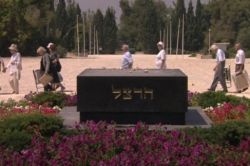Mark:
In the gardens of Mt Herzl, (named for Theodor Herzl, the founder of modern political Zionism) sits a cemetery where the grave of Herzl and many other Israeli state figures lie. Adjoining the cemetery is a park in which the elderly members of the ‘Mt Herzl Academy’ meet every Saturday for food, friendship and robust discussion of politics and philosophy. Two members are Lena Bar and Minya Rubin – friends since childhood and later sisters-in-law. A close examination of their relationship forms the basis of this film, written and directed by Minya’s granddaughter Tali Shemesh.
 The members of the Mt Herzl Academy are old and wizened, but their wit and spark remain. Some grieve for difficult relationships with children; others dwell still upon the Holocaust and their sufferings from so long before. They are united by their friendships and by a desire to maintain this regular meeting that adds meaning to their lives – a picnic aside the national memorial for great Israelis, with friends who have similar life experiences and losses. During the five years of the making of this film, however, they will face the loss of several of their members, and Lena and Minya will examine the dysfunction borne of their inter-reliance.
The members of the Mt Herzl Academy are old and wizened, but their wit and spark remain. Some grieve for difficult relationships with children; others dwell still upon the Holocaust and their sufferings from so long before. They are united by their friendships and by a desire to maintain this regular meeting that adds meaning to their lives – a picnic aside the national memorial for great Israelis, with friends who have similar life experiences and losses. During the five years of the making of this film, however, they will face the loss of several of their members, and Lena and Minya will examine the dysfunction borne of their inter-reliance.
Shemesh has obtained total honesty from her subjects, particularly Lena who ranges from abrupt and dismissive to wistful and considerate. Minya still thinks back to her past, and scenes featuring her return to her childhood home in Poland are extremely moving. Arguments between the two are captured, alongside shared relaxation time and hilarious observation of others. Their time sitting in deckchairs in the Red Sea commenting on their fellow swimmers is one such scene.
Their underlying conflict is ever present, however, and Shemesh doesn’t shy away from this basic fact. Lena is presented as a know-it-all who dismisses her sister-in-law’s opinion on many issues, and patronises her with attacks on her lack of formal education. Minya, however, is somewhat too accepting and passive, allowing Lena to boss her around and only rarely standing up for herself. The subtle way in which Shemesh enunciates much that is unspoken between these two confirms real skill.
Tali Shemesh has made a beautiful deliberation on friendship and the things that shouldn’t go unsaid. That she is so close to her subjects doesn’t inhibit her from demonstrating their flaws, and she certainly never acts as apologist. Her relationship to her elderly relatives actually feels like an advantage – perhaps no other could be afforded the trust and honesty she obtains.
Rating: